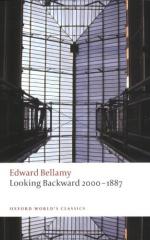|
This section contains 4,981 words (approx. 17 pages at 300 words per page) |

|
SOURCE: “The Reader and Looking Backward,” in The Journal of General Education, Vol. XXXIII, No. 1, Spring, 1981, pp. 69-79.
In the following essay, Khanna contends that the popularity of Looking Backward is founded on the text's sophisticated projection of an ideal reader, a process that mirrors the narrator's journey to a utopian society.
Looking Backward, 2000-1887 (1888) is one of the classics of American fiction and was, in its own time, a best-seller. It sparked innumerable imitations in fiction (some 154 utopian novels were published between 1888 and 1900) and exerted an enormous influence on such disparate thinkers as John Dewey, Thorsten Veblen, and Eugene V. Debs. In imaginative, philosophical, and political terms, Looking Backward did, as Joseph Schiffman has said, “profoundly influence the American mind.”1 Nor was its influence confined to this continent, for as Sylvia Bowman has recently shown, it was translated into numerous languages and influenced European writing and politics...
|
This section contains 4,981 words (approx. 17 pages at 300 words per page) |

|


